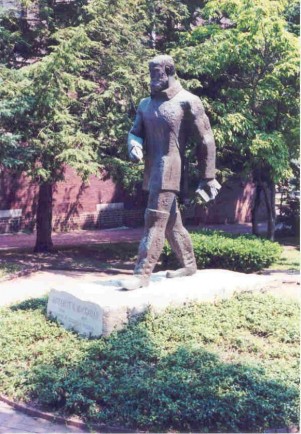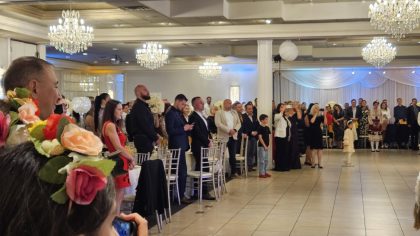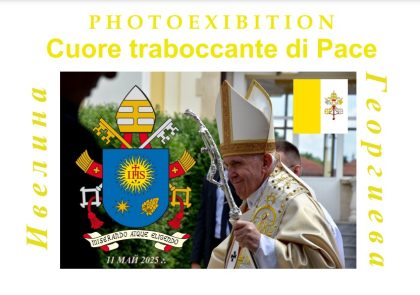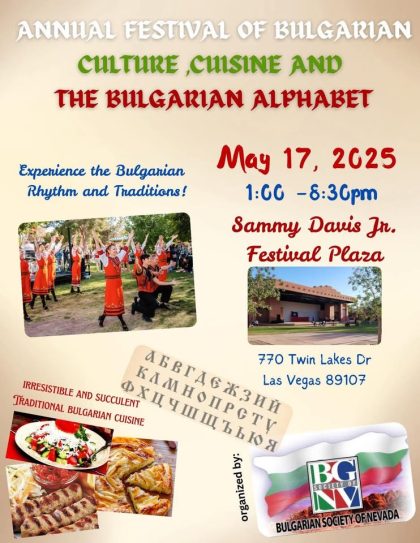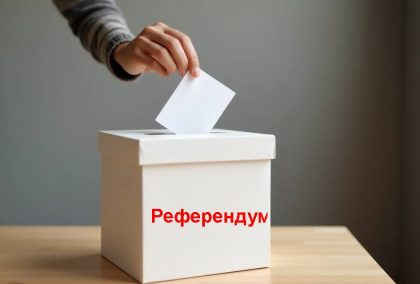The MacGahan Festival
June 10-11, 2011
New Lexington, Ohio
To preserve the memory of Januarius A. MacGahan
journalist and war correspondent 1844-1878
The MacGahan American Bulgarian Foundation hosts an annual weekend American-Bulgarian festival in New Lexington, OH. in early June in tribute to MacGahan and in celebration of the Bulgarian culture and heritage that he helped preserve. The festival is open to the public.
Friday Knights of Columbus Hall
Jefferson St at Monument Square
Routes 13 and 37
Knights of Columbus Spaghetti Dinner 5:00 p.m.
Informal get-together for MacGahan Festival guests
Saturday morning:
Memorial service at the grave of MacGahan 10:30 a.m.
Rev. Robert E. Willmann of Zanesville St. James Episcopal Church
New Lexington Cemetery at the end of Swigart Street
Floral tribute at the MacGahan statue
at Main and Brown Streets across from the Perry County Court House
Luncheon and program: The Perry County Library on Jackson Street 12:00 noon
Presentation to Alan Miller of the Columbus Dispatch
honoring the late Mike Harden
Keynote speaker: Plamen Petkov, Boston MA
Producer of documentary “The Liberators of Bulgaria”
MacGahan and the Unsung Heroes of the 19th Century
Presentation of the MacGahan Foundation scholarships
Kelsey Bair/New Lexington HS and Susan Cherry/Crooksville HS
Festival Planning: Christina Atanassova: Bulgarian-American Cultural and Education Society of Los Angeles , Boyan Alexandrov of Bulgarska Roza at the Ohio State University, and Joe Farrell of Cambridge, OH.
For more information visit website of Tom MacGahan
http://www.jamacgahan.org
Statue of MacGahan created by Lubomir Daltchev
/photo by Ron Houston/
MacGahan and his Investigation of Turkish Atrocities in Bulgaria (1876)
In 1876 MacGahan quarreled with James Gordon Bennett Jr., the publisher of the New York Herald, and left the newspaper. He was invited by his friend, Eugene Schuyler, the American Consul-General in Constantinople, to investigate reports of large-scale atrocities committed by the Turkish Army following the failure of an attempted uprising by Bulgarian nationalists in April 1876. (See April Uprising.) MacGahan obtained a commission from the London Daily News, then the leading liberal newspaper in England, and left for Bulgaria on July 23, 1876.
After visiting Philippopolis on July 28, and Peshtera and Pazardjik on August 1 and 2, MacGahan travelled to the village of Batak, and sent the paper a graphic report of what he saw:
„…We looked into the church which had been blackened by the burning of the woodwork, but not destroyed, nor even much injured. It was a low building with a low roof, supported by heavy irregular arches, that as we looked in seemed scarcely high enough for a tall man to stand under. What we saw there was too frightful for more than a hasty glance. An immense number of bodies had been partially burnt there and the charred and blackened remains seemed to fill it half way up to the low dark arches and make them lower and darker still, were lying in a state of putrefaction too frightful to look upon. I had never imagined anything so horrible. We all turned away sick and faint, and staggered out of the fearful pest house glad to get into the street again. We waled about the place and saw the same thing repeated over and over a hundred times. Skeletons of men with the clothing and flesh still hanging to and rotting together; skulls of women, with the hair dragging in the dust. bones of children and infants everywhere. Here they show us a house where twenty people were burned alive; there another where a dozen girls had taken refuge, and been slaughtered to the last one, as their bones amply testified. Everywhere horrors upon horrors…“
MacGahan reported that the Turkish soldiers had forced some of the villagers into the church, then the church was burned and survivors tortured to learn where they had hidden their treasures. MacGahan said that of a population of seven thousand, only two thousand survived. According to his account, fifty-eight villages in Bulgaria had been destroyed, five monasteries demolished, and fifteen thousand people in all massacred.
These reports, published first in the London Daily News, and then in other papers, caused widespread popular outrage against Turkey in Britain. The government of Prime Minister Benjamin Disraeli, a supporter of Turkey, tried to minimize the massacres and said that the Bulgarians were equally to blame, but his arguments were refuted by the newspaper accounts of MacGahan.
Following the publication of MacGahan’s articles, William Ewart Gladstone wrote a pamphlet called Bulgarian Horrors: „I entreat my countrymen,“ he wrote, „upon whom far more than upon any other people in Europe it depends, to require and to insist that our government, which has been working in one direction, shall work in the other, and shall apply all its vigour to concur with the states of Europe in obtaining the extinction of the Turkish executive power in Bulgaria. Let the Turks now carry away their abuses in the only possible manner, namely, by carrying off themselves….“
Russian-Turkish War (1877-78)
The Russian Government, stirred by anti-Turkish and Pan-Slavism sentiment, prepared to invade Bulgaria, and declared war on Turkey on April 24, 1877. The Turkish Government of Sultan Abdul Hamid II appealed for help to Britain, its traditional ally against Russia, but the British government responded that it could not intervene „because of the state of public feeling.“
MacGahan was assigned as a war correspondent for the Daily News, and, thanks to his friendship with General Skobelev, the Russian commander, rode with the first units of the Russian Army as it crossed the Danube into Bulgaria. He covered all the major battles of the Russian-Turkish War, including the siege of Plevna and Shipka Pass. He reported on the final defeat of the Turkish armies, and was present at the signing of the treaty of San Stefano, which ended the war.
He was in Istanbul, preparing to travel to Berlin for the conference that determined the final borders of Bulgaria, when he caught typhoid fever. He died on June 9, 1878, and was buried in the Greek cemetery, in the presence of diplomats, war correspondents, and General Skobelev. His body was five years later returned to the United States and reburied in New Lexington, and a statue was erected in his honor by a society of Bulgarian-Americans.
MacGahan is still remembered in Bulgaria for his role in winning Bulgarian independence. A street in the capital, Sofia, is named for MacGahan, as is a square in the city of Plovdiv, and streets and squares in several other towns.
There is also a memorial service each June in his honor in his hometown of New Lexington. /wikipedia.org/
